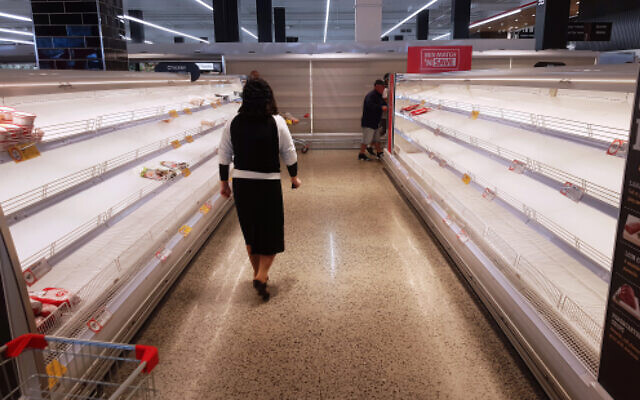Feed my soul
'COVID-19 has created an incremental demand for food from not just our most needy, but from mainstream homes that are facing this shortage for the first time in their lives'.
IS there enough food in our home, community, state or country? Is there enough food in the world? Of course there is, and the world production of foods both agricultural and processed could feed every single person on this planet, with leftovers for tomorrow night.
Yet, COVID-19 has created an incremental demand for food from not just our most needy and vulnerable in our community, but from mainstream homes that are facing this shortage for the first time in their lives.
In our small Jewish community of Melbourne, charitable organisations and individuals are committed to providing fresh and frozen meals, packs and ingredients to several hundred recipients on a daily, weekly and monthly basis. These recipients are largely connected with the Jewish community but a growing number are coming from regions not commonly known for having a Jewish population.
From providing challah and wine and wholesome soups, from nutritious dinners to a light but appreciative sweet snack, the full spectrum of offerings has been covered. The individuals and organisations who have initiated these services have good intentions and a singular goal of helping the needy. We really have a giving community.
This momentum has now grown to several community groups essentially performing the same service, often to the same recipients. There seems to be a duplication of services which I believe could be more streamlined and productive.
No one is discounting the genuine intentions of people or organisations starting these ideas and services but it must be asked if some of them are creating something that may already exist. The focus must be the recipient community and what the most effective and efficient way of servicing them is. If a daily or biweekly hot meal is required, or Shabbat meals provided or social visiting combined with meal delivery is needed, there are established bodies that already do this. Sometimes it seems like organisations or individuals develop these programs as a team building exercise to encourage volunteering with a positive message rather than thinking through the logistics, costs and replication of community resources.
Community organisations and individuals often feel helpless during a period like COVID-19 and simply want a way to give back. Often this forms as an idea for a charity food concept and before they have researched any possible existing service available, they are off with an Instagram and Facebook page and before you know it, the service is up and running.
I think this community spirit is fantastic but I can’t help but think that it is not always so well thought out for long-term success. Managing food relief is a complex, temperamental and often difficult project. It takes skill and has a higher risk factor than other charity concepts such as clothing, shelter and non-perishables. Often the ideas start with strong momentum and then the steam runs out and leaves the recipients with no service at all.
There are two to three highly resourced and structured food relief bodies in our community. They run with modest budgets but with high penetration. They provide the right mix of meals and social interaction to a cross section of our community both religiously and culturally. They liaise with our official community care bodies to ensure streamline delivery with maximum benefit. They have the volunteer database and manpower to deliver current and new programs if required.
Perhaps the best path to success is for smaller and new food relief groups to present their ideas to the existing food provision organisations where there is established infrastructure and resources. New ideas can be evaluated and integrated into current workflows to ensure program longevity and, most importantly, provide adequate coverage and products to our most needy and vulnerable fellow community members without duplication and with a sustainable long-term strategy.
Daniel Jenshel is a previous Jewish Care board member, immediate past president of Caulfield Shule and on the CCARE advisory board.


comments